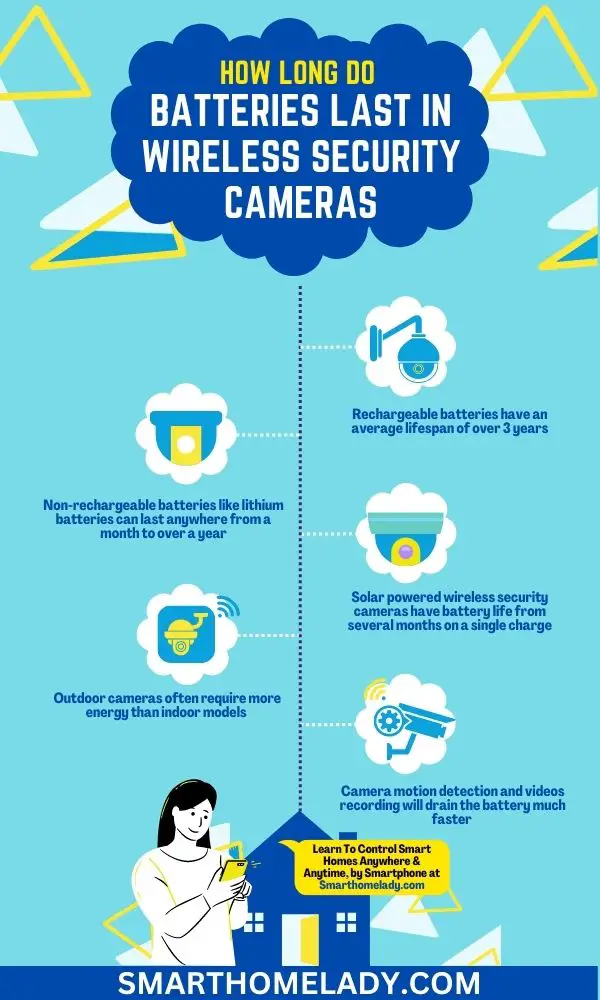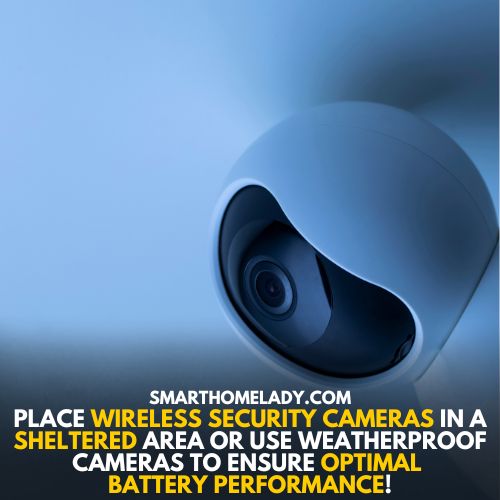Wireless security cameras have become increasingly popular due to their convenience and ease of installation.
However, one question that arises when considering purchasing a wireless security camera is; “how long do batteries last in wireless security cameras?”
The answer depends on several factors, including the type of battery, usage frequency, and environmental conditions.
For those who want to get the most out of their wireless security camera batteries, it’s important to understand these factors and how they affect battery life.
In this article, we’ll explore the different types of batteries commonly used in wireless security cameras and how long they last.
So, let’s start it.

Contents
- 1 How Long Do Batteries Last in Wireless Security Cameras
- 2 6 Factors Affecting the Wireless Security Cameras’ Battery Life
- 3 How To Extend Battery Life Of Wireless Security Cameras – Tips
- 4 Which wireless security camera has the longest battery life?
- 5 How do wireless cameras stay charged?
- 6 Do wireless security cameras use batteries?
- 7 How many times can you recharge a camera battery?
- 8 Can wireless cameras work without electricity?
- 9 Conclusion
How Long Do Batteries Last in Wireless Security Cameras
The battery life of a wireless security camera can vary depending on how often you use it and the type of battery you have.
Rechargeable batteries usually last the longest, with an average lifespan of over 3 years and at least 500 charge cycles.
In my own experience, I’ve found that rechargeable batteries in my wireless security camera can last around 6-9 months with regular use.
On the other hand, non-rechargeable batteries like lithium batteries can last anywhere from a month to over a year, depending on how much you use the camera.
Some wireless security cameras are powered by solar panels, which can give you several months of battery life on a single charge.
Specifically, outdoor cameras often require more energy than indoor models due to harsh weather conditions and increased exposure to sunlight.
Keep In Mind – Other factors like how often the motion detection is triggered, the video recording quality, temperature, weather conditions, and Wi-Fi signal strength can also affect the battery life.
If you want more specific information on battery life and tips on how to make it last longer, I recommend checking the camera’s user manual or reaching out to customer support. They’ll be able to give you all the details you need.
Must Read: How Do Wireless Security Cameras Get Power? 3 Ways
6 Factors Affecting the Wireless Security Cameras’ Battery Life
Factors affecting the battery life of wireless security cameras can vary depending on several factors.
1. Frequency Of Motion Detection In Wireless Security Cameras
One crucial aspect is the frequency of motion detection.
If your camera is constantly detecting motion and recording videos, it will drain the battery much faster compared to a camera that only activates when significant motion is detected.
Therefore, adjusting the sensitivity of motion detection settings can significantly impact battery life.
2. Quality Of Video Recording Affects Battery Life
Another factor to consider is the quality of the video recording. Higher video resolutions and frame rates require more power to process and store the footage.
While it’s tempting to capture videos in the highest quality possible, it’s important to find a balance between video quality and battery life that suits your specific needs.
3. Temperature and Weather Conditions
Temperature and weather conditions can also play a role in battery life. Extreme temperatures, whether hot or cold, can affect the performance of the battery.
It is recommended to place wireless security cameras in a sheltered area or use weatherproof cameras to ensure optimal battery performance.

Must Read: How To Install Wireless Security Cameras?
4. WiFi Signal Strength
The strength of the WiFi signal is another important factor to consider. If the camera is located too far away from the WiFi router, it may struggle to maintain a stable connection.
As a result, the camera will consume more power while trying to establish and maintain a connection, leading to reduced battery life.
Ensuring a strong and stable WiFi signal in the camera’s location can help prolong battery life.
5. Battery Type
The type of battery used in the wireless security camera is also worth considering. Different types of batteries have different capacities and power efficiencies.
Lithium-ion batteries are commonly used in wireless security cameras due to their high energy density and longer lifespan.
It’s essential to choose a camera that utilizes a high-quality battery to maximize battery life.

Must Read: Do Wireless Security Cameras Need Batteries?
6. Settings Of Wireless Camera
Lastly, camera settings can have a significant impact on battery life. Some cameras offer power-saving modes or scheduling options that allow you to customize when the camera should be active.
By utilizing these settings and only activating the camera when necessary, you can extend the battery life.
How To Extend Battery Life Of Wireless Security Cameras – Tips
To maximize battery life, there are several power-saving techniques that users can employ.
- One such technique is adjusting the camera’s motion detection settings to reduce false alarms and unnecessary recordings.
- Additionally, using battery-saving accessories such as solar panels or rechargeable batteries can help extend the life of your camera’s power source.
By implementing these strategies, users can avoid frequent battery replacements and ensure their cameras remain operational for longer periods of time.
While optimizing power consumption through various methods will certainly extend battery life, it should also be noted that certain types of cameras may have inherently shorter lifespans due to environmental factors.
Must Read: Do Wireless Security Cameras Need Internet?
Which wireless security camera has the longest battery life?
Blink outdoor spy camera and Blink indoor camera are two exceptional options that stand out for their impressive battery life.
The Blink outdoor spy camera, designed specifically for outdoor use, has an extraordinary battery life of up to 2 years with typical usage.
It means you can enjoy continuous surveillance without constantly worrying about changing batteries or finding a power source.
Similarly, the Blink indoor camera offers an equally impressive battery life, ensuring reliable monitoring inside your home for up to two years as well.
These cameras are perfect for those seeking long-lasting security solutions without the hassle of frequent battery replacements.
Must Read: How To Connect Wireless Cameras To Phone?
Frequently Asked Questions FAQs
How do wireless cameras stay charged?
Wireless cameras typically stay charged through various methods.
Some wireless cameras use rechargeable batteries, allowing you to charge them via a power outlet or USB port. These batteries can provide power for several months before needing to be recharged.
Other wireless cameras have the option to be connected to a power source directly, such as through an electrical outlet or a solar panel.
These cameras continuously receive power, eliminating the need for battery recharging.
Do wireless security cameras use batteries?
Yes, wireless security cameras can use batteries. Many wireless security cameras are designed to be battery-powered, providing flexibility in their placement.
These cameras often come with rechargeable batteries that can be easily removed and recharged as needed. This makes them a great option for places where running electrical wiring is challenging or not possible.
How many times can you recharge a camera battery?
The number of times a camera battery can be recharged depends on the specific battery model and its quality.
Generally, rechargeable camera batteries can be recharged hundreds of times before they start to degrade. For example, some high-quality camera batteries can endure up to 500 recharge cycles.
However, it’s worth noting that over time, the battery’s maximum capacity may decrease, resulting in shorter battery life.
It’s always a good idea to follow the manufacturer’s guidelines for battery usage and charging to maximize its lifespan.
Can wireless cameras work without electricity?
Yes, wireless cameras can work without electricity. As mentioned earlier, some wireless cameras are battery-powered, allowing them to function without a direct electrical connection.
These cameras can be placed in various locations, including areas where access to electricity is limited or not available at all.
Additionally, some wireless cameras can be powered by alternative energy sources, such as solar panels. This enables them to operate even in remote areas or during power outages.
Conclusion
In conclusion, the lifespan of batteries in wireless security cameras depends on various factors such as the type of battery used, camera settings, and environmental conditions.
However, with proper maintenance and usage techniques, you can extend your battery life significantly.
To ensure your wireless security camera lasts longer before requiring a recharge or replacement, avoid using high-resolution settings unnecessarily and limit unnecessary recordings.
Go ahead and enjoy uninterrupted surveillance.
Sources
- Battery Powered Wireless Security Cameras (Source Link)
- Maximize Battery Life Of Wireless Security Cameras (Source Link)
- Outdoor Security Cameras – Rechargeable Battery (Source Link)

